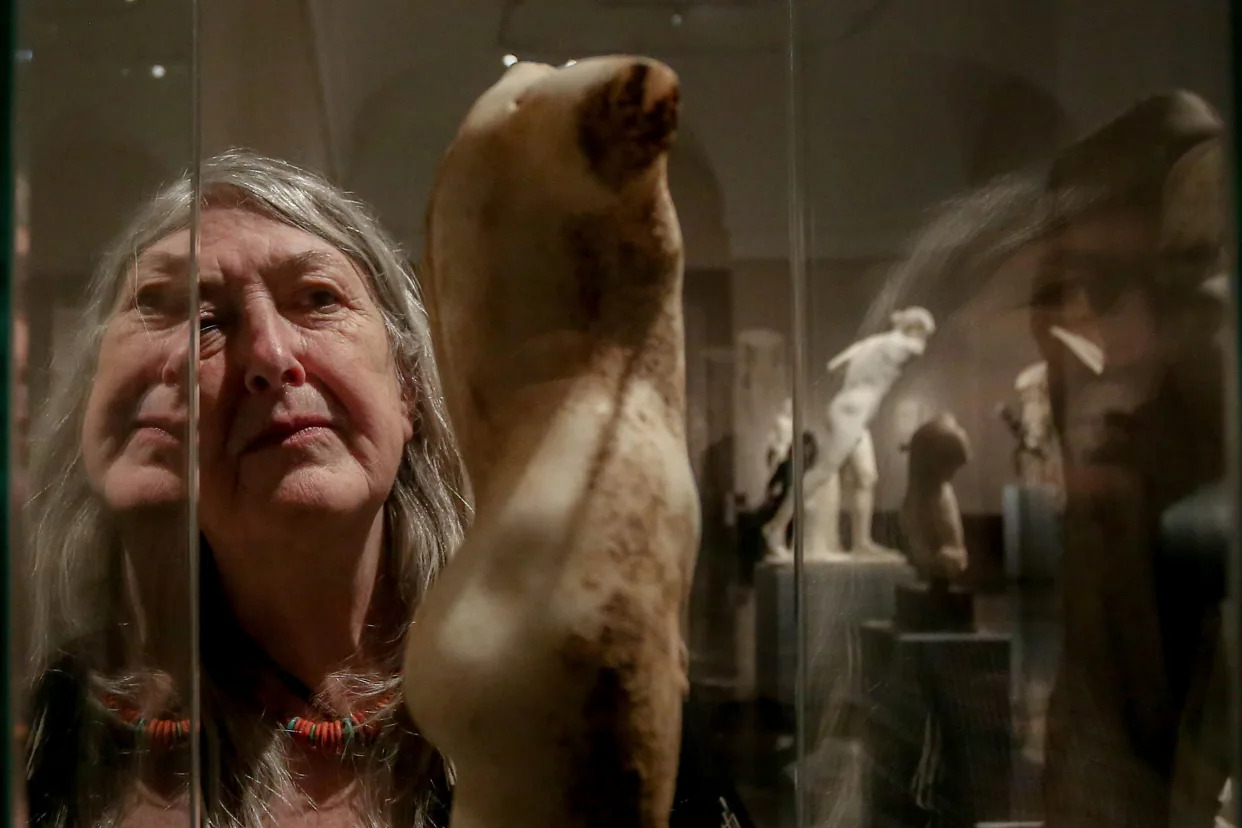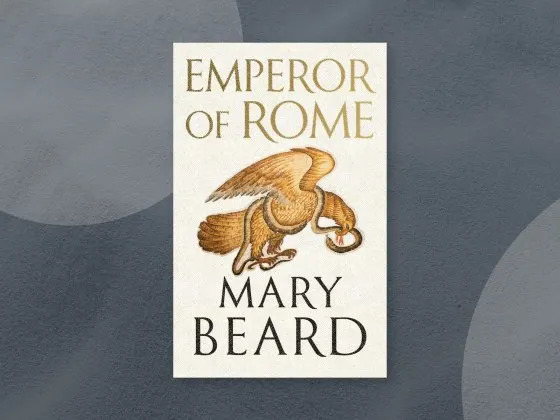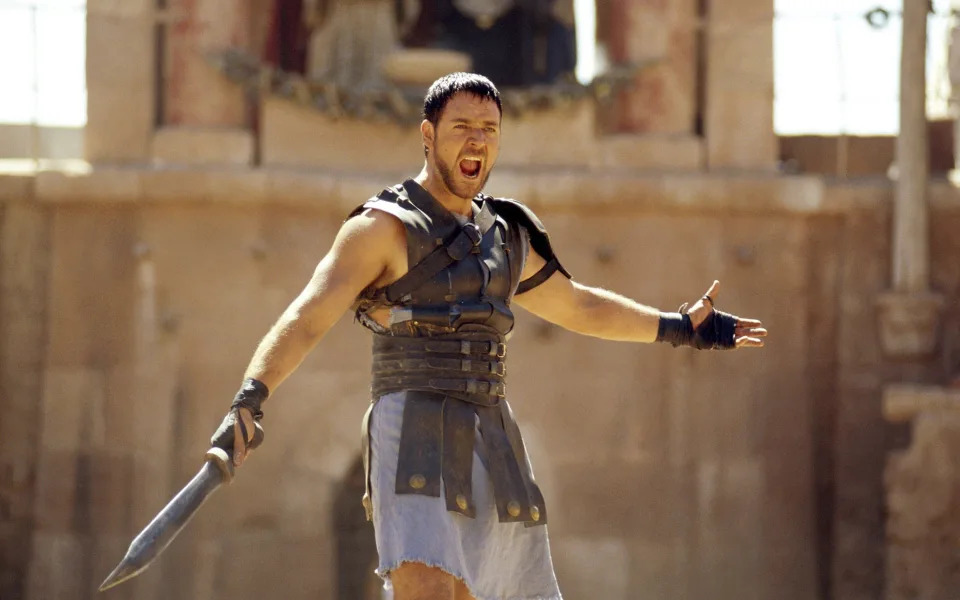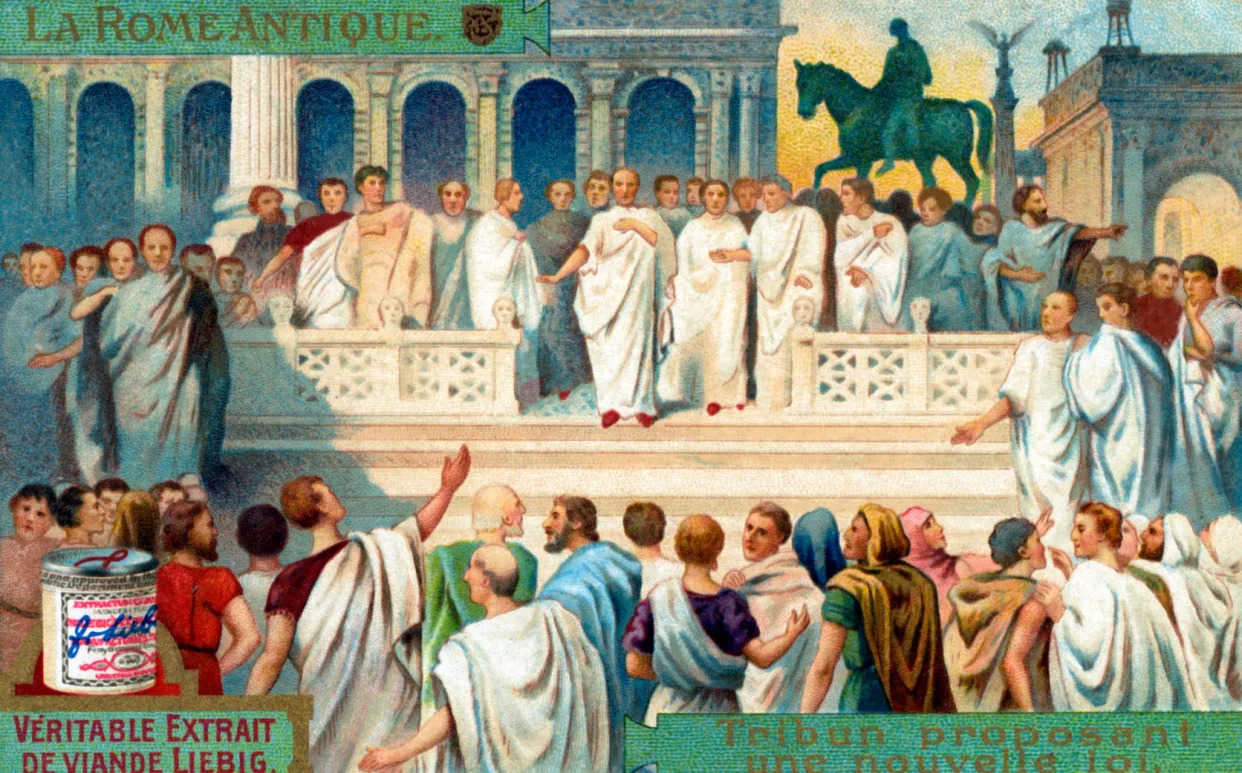Olivia B. Waxman
Thu, September 28, 2023

Historian Mary Beard poses during an interview at the Prado Museum in Madrid on Oct. 29, 2021.
To a historian of ancient Rome like Mary Beard, it’s always timely to talk about the empire. But her new book about the daily lives of Roman Emperors, Emperor of Rome: Ruling the Ancient Roman World, is due to come out in the U.S. when the Roman Empire has been trending on TikTok.
Women have been posting videos of themselves asking the men in their lives how often they think about the Roman Empire and expressing shock as these boyfriends and husbands say they think about the Roman world all of the time. Beard, meanwhile, does not need to ask her husband how often he thinks about the Roman Empire—he is an art historian who studies Roman art.
Whether these men on TikTok are serious or joking, the reasons why they say they think about the ancient Roman world offer Beard a starting point for discussing what modern conveniences we can attribute to the ancient Romans and what’s the stuff of myth.
In a phone conversation with TIME on Sept. 26, Beard, also the author of SPQR: A History of Ancient Rome, explained the proper way to wear a toga and set the record straight on other misconceptions about the Roman Empire running rampant on TikTok.
More From TIME
The following conversation has been lightly edited and condensed.

Does the Roman Empire have a special appeal among men? Why or why not?
In some ways, ancient Rome is a kind of safe place for macho fantasies. It's where men can pretend to be macho men. That must be part of the appeal, I suppose. And people say to me, 'Well, you must think that's awful, don't you?' Anything that brings people to be interested in the ancient world is fine by me. But I'm very keen that they should see that there's more to the ancient world than macho fantasies. I think my job is to say, 'Okay, you've gotten interested in Rome. Now, I'm going to tell you it's more interesting than you thought.'
What should people be thinking about when they think about the Roman Empire?
It was not all generals and posh white men. This was a culture built on slavery. Last week, I went to Rome and I went to the Palatine palace—the kind of mission control of the Roman Empire. There's one little area there, which must have been an area for the staff, the slaves, the service quarters. The [servants] have written all over the walls of this area in graffiti scrawls. There is a parody of the crucifixion of Jesus. It was probably done in the late second century CE. It might be the earliest representation of the crucifixion of Jesus that we have. There's a man being crucified on the cross, but he has a donkey's head. There is a figure in a tunic next to him clearly praying to him. We can also see that the slaves are into Christianity before the Emperors—it was another 100 years before any emperor became a Christian. So there are other stories to tell, not just stories about the big guys.
One guy on TikTok says he thinks about the Roman Empire because men at their core are warriors and have to be ready for battle and the Roman Empire is all about battle.
The Roman Empire is partly about battle. We've got to remember that those emperors didn't conquer the Roman Empire. The Roman Empire had been brutally acquired when Rome was still a democracy. And actually not many Roman emperors do much conquering at all, and they make a kind of show of the image of the brand. They have loads of statues of themselves dressed up as warriors. But in some ways, that's a substitute for conquering. They're not actually doing very much.
Other guys on TikTok have said they associate Romans with togas and think about Rome when they use the bathroom because of their role developing sewage systems. How accurate is that?
Roman people did not wear the toga every day. They wore the toga on special occasions. If you went to the Colosseum, that's a bit like going to the opera in London, so you wear your toga just like you’d wear a tuxedo. But most Romans wore tunics and they wore all white and probably wore trousers, actually. This idea that Rome was a nation in which everybody wore togas—that's simply untrue. I also think that we overestimate the sophistication of Roman sewage work and Roman drainage. In the middle of a flood, things like octopuses came up in people's lavatories.
Now let’s talk about your new book Emperor of Rome. You talk about the cross-dressing ruler Elagabalus. What do you want readers to take away from his story?
Some of our questions about gender fluidity —what counts as male and what counts as female—they're not new. I don't think the Romans give us an answer to that. But I do think it's helpful for us to realize that our issues weren't invented 20 years ago. It's really important to see that these questions go back millennia. I don't think there has been a human culture that hasn't wondered about the nature of what it is to be male or what it is to be female.
I was disappointed to learn in your book that Caligula did not really appoint his horse consul. How did that myth become so widespread?
There are sources which say Caligula threatened the Senate that he would appoint his horse consul, and that always gets quoted as, “Caligula made his horse consul.” He’s one of a whole series of emperors who treat their horses almost like people.
Why does Julius Caesar get so much attention?
The answer is probably because he was assassinated. Shakespeare writes up that moment as an absolutely crucial moment in thinking about political justice and political fairness. But Julius Caesar wasn't around very long as dictator. He was mostly not in Rome. He mostly didn't finish things.
Who was the most overrated Roman emperor?
I would say that Claudius has been very lucky, partly because of Robert Graves, between I, Claudius and Claudius the God and the TV series. They turned Claudius into a slightly charming, old academic emperor, a kind of Uncle Claudius, a sort of nice guy. That was fiction. If you go back and you read what Romans were saying about Claudius, he was a murderous bastard.
Who was the most important Roman Emperor?
Augustus, the first proper Roman Emperor after Caesar, because he sets the whole system up. He rules for 40 years. And he actually ensures that there is a system that will last. The emperors don't last, but the autocratic system lasts, and Augustus is very largely responsible for that.
What would Romans have thought of TikTok and social media?
They would have loved it. Romans like graffiti. They would have loved sharing the equivalent of graffiti. Rome was a master of image creation and image replication You see these idealizing—in our terms, Photoshopped—images of the Emperor Augustus all over the place. In that sense, they're very modern. They certainly want to leave them on any wall they post. They want to say, 'Marcus was here.'
Write to Olivia B. Waxman at olivia.waxman@time.com.
Mary Beard weighs in on macho men’s TikTok fixation on Roman Empire
Patrick Sawer
Wed, September 27, 2023

Mary Beard says a lot of men prefer to think about the Roman Empire as a 'safe space for being macho' - Caterina Turroni/Lion TV
The classicist Mary Beard has weighed in on the TikTok trend of women asking their partners how often they think of the Roman Empire by claiming that men consider the era a “safe space to be macho”.
The author and broadcaster has said a new generation of men look fondly on the Roman Empire as a place to behave in a macho way without fear of any resistance by women.
Dame Mary, who launches her new book, Emperor Of Rome: Ruling The Ancient Roman World, on Thursday, was commenting on the surprising social media trend in which women post short videos asking their husbands or boyfriends how often they think about the Roman Empire – with many of them claiming to do so several times a week and even daily.
She said: “It’s extraordinary ... one thing I think about that is [that the] Roman Empire is a sort of safe space for being macho in, you imagine that it’s so long ago, you can indulge your macho fantasies without it really mattering, I think is what’s going on there.”

Russell Crowe in Gladiator - the misogynist's fantasy man
But the 68-year-old historian suggested that Ancient Rome was not as one-dimensional as many men might imagine.
“I suppose I think that for people like me, women who work on the Roman Empire, this is our moment also to tell these blokes that the Roman Empire is a bit more interesting than perhaps they think it is,” she said.
Dame Mary, whose new book examines Roman rulers and what powers they wielded, also said that Carrie Johnson had frequently been portrayed as the real power behind Boris’s rule during the couple’s time in Downing Street, in the manner of a Roman Emperor’s wife.
Her comments coincide with a new Sky TV drama series about Livia Drusilla, the wife of Caesar Augustus, who became one of the most powerful women in the world in her own right.
‘Streak of misogyny’
Dame Mary said there was a “good streak of misogyny” in the way Drusilla was blamed for the intrigue within the palace walls and in particular the deaths of the Emperor’s many rivals.
She said: “Look for what is going wrong in the Roman Empire, right, in the palace, we can’t see inside, but look at how we imagine all this happened? Well I’ll tell you, it’s by a scheming, manipulative woman.
“Carrie Johnson was subjected to the same sort of gossip, wasn’t she? Why did Boris do that? Well, it’s because Carrie wanted it. And why did Augustus do that? Because Livia wanted it. What did Livia do? She poisons people. What’s poisoning? Well, poisoning is a kind of perverted form of cookery. The woman who should be the nurturer actually kills you.”

Kirk Douglas grapples in Spartacus - a particular fantasy of many men, according to Mary Beard - Silver Screen Collection
Dame Mary, who debated with Mr Johnson on the subject of Greece vs Rome at an Intelligence Squared session in November 2015, said: “In the end, I think Boris Johnson is someone who’s put the ancient world very much front in his image and I think we need to think about that, whether he’s getting it right, and whether it was all a pose.
“I think that there are more interesting things to think about in the ancient world than how Boris Johnson sees it, that’s for sure.”
Dame Mary said her new book examined the way the emperors were able to exercise power through more subtle means than fear alone and that lots of the empire’s citizens “probably disapproved” of the autocratic regime.
“Rome didn’t just survive because of violence or because they’re a police state, they survive because most people actually go along with them,” she said.
Casey Haughin-Scasny
Wed, September 27, 2023

In this op-ed, writer Casey Haughin-Scasny explores the virality of the recent “How often do you think about the Roman Empire?” TikTok trend in the context of how history is constructed.
I am a woman who thinks about the Roman Empire every single day. Not just the innovations of its legal system, or its monumental architecture, or even the staggering scale of its bureaucracy, but about the way its historical legacy has been written and rewritten, and how we understand the realities of life in its past.
The recent TikTok trend hinges on a simple question, with women asking their male partners, family members, or friends about the frequency of their ruminations on Rome. The recorded responses range from confusion over the very term “Roman Empire” to opinions about the legitimacy of different emperors. While there is a fair share of men who don’t think about the Roman Empire at all, the absurdist comedy of the question hinges on the prevalence of men who do think about the Roman Empire, almost reverently or obsessively, unbeknownst to their female loved ones.
The revelations, shared on TikTok, have generated a deluge of content that involves (predominately white) men justifying their interest, often appealing to the “lessons” to be learned from the Empire’s rise and fall, or the importance of Rome in the modern world. Women, in response, have asked each other what the female “Roman Empire” is—that is, to say, what women regularly think about in history that men are not aware of. Responses have varied, but they primarily include the Titanic, the Triangle Shirtwaist Factory Fire, the Romanovs, and Greek mythology.
It could be another harmless internet fad, except for what it implies about the way history is passed down and constructed. The trend demonstrates how popular perceptions of Rome rely on an interpretation of history that many scholars now recognize to be actively harmful, both to our ability to understand the ancient past and to our society at large.
My work as a PhD candidate in public history examines how Americans have used, abused, and misconstrued the ancient past in order to make meaning in their present from the 18th century to today. I am also an archaeologist who has participated in the excavation of a Roman villa since I was 19. I teach classes on Roman art and archeology. Since my first introduction to Latin at the age of eleven I have been fascinated with Rome. I would say between now and then there is likely not a day that has gone by that I have not thought about the Roman Empire. My gender does not prevent me from joining in on the fun. Women are interested in the ancient past! Who knew?
Many folks don’t. And there’s a reason for that.
The commentaries on TikTok reveal the prevalence of the “great man” narratives that progressive scholars have worked so hard in recent years to supplement, challenge, and contextualize. The Roman Empire that exists within the minds of TikTok users is one that is inherently of interest to men — and, given the way it’s being talked about, why wouldn’t it be? It’s something of a Kendom, really. Maybe the Domus Aurea is the original Mojo Dojo Casa House.
Much of the image that we have constructed around Rome in popular culture — its place as the basis of “Western” civilization, the brilliance of its expansion under various male emperors and generals, the superiority of its rulership, the inevitability of its demise — relies on outdated imaginations of the ancient world. A significant part of this narrative involves androcentric interpretations of the past that emphasize “great man” history over the lives of the vast majority of the Empire’s citizens.
In the fascination over emperors and their proclivities for conquest, we lose sight of the complex tapestry that influenced daily life in the Roman empire. Not only that, we often risk reaffirming the very active schools of thought within white supremacist circles that these Roman “white” men were naturally positioned to conquer the known world due to their innate superiority. This might sound dramatic, but it’s not — there’s an entire country as proof. All we have to do is look to the very foundation of America, from its governance to its laws to its architecture and so many things in between, to see how ideas about ancient Rome’s success and values have been purposefully taken on, manipulated, and baked into power structures that continue to marginalize communities to this day (Dr. Lyra D. Monteiro’s phenomenal article “Power Structures: White Columns, White Marble, White Supremacy” is a great introduction to the issues at hand). Uncritical praise of Rome for all the seemingly positive things it’s given us does little to unpack how this heritage has been leveraged historically.
I’m not out here trying to say that Rome was some kind of egalitarian paradise where women were seen as equals in the eyes of the law or in social situations. In fact, I’m saying the opposite — Rome was an inherently unequal society, and the Pax Romana that so many admire was built on the oppression of various demographics, women among them. When we simply focus on great men in these histories and romanticize imperialism, we lose the opportunity to understand how marginalized groups navigated these circumstances in ways ranging from the mundane to the extraordinary. We also lose the opportunity to consider why people from historically marginalized backgrounds would want to learn about Rome now.
The trend’s relegation of women’s interests in antiquity to mythology, and specifically Greek mythology, further reveals the divides that are so prevalent in the popular and academic studies of ancient history. Rome stands as the powerful, militaristic foil to Greece’s more refined, softer lifestyle, and mythology as a more appropriate option for women’s interests than the intricacies of rule and bloodshed. This divide is, of course, artificial. That hasn’t stopped generations of people from relegating women to limited, “appropriate” areas of study, if they’re permitted to engage with antiquity at all, or assuming that women are incapable of or uninterested in engaging with traditionally “masculine” aspects of the ancient past like epics or tactical histories. This isn’t to say that women can’t be interested in mythology — it’s awesome! But there’s nearly a millennium of baggage to consider before we accept these divisions wholesale.
The men who are featured on TikTok are almost certainly not considering the legacies above when they’re thinking about the Roman Empire. And that’s exactly the issue — as long as these assumptions about the past are commonplace, the harm that is done by their invocation will persist. The trend reveals just how pervasive longstanding assumptions about Rome are, and when these assumptions remain unchecked, we’re able to see the consequences.
The presumption that women aren’t interested in these histories comes from these biases, but it’s not an innocent one. Even if we put aside all of the other issues I’ve outlined here, the impact these biases have on the study of antiquity is alive and well. I regularly watch male colleagues as their eyes glaze over while female colleagues talk about their work on social histories of the Roman Empire or the pitfalls of ancient reception, while men I meet in my life outside academia assume their cursory knowledge based on this imagined past is equivalent or superior to my knowledge after a decade of training. I’ve sat through too many disrespectful Q&As to not understand the consequences of the possessiveness men hold over Rome in how it affects women’s abilities to engage with ancient history. This article doesn’t even scratch the surface of how these issues are amplified for scholars who occupy intersecting identities as people of color, or members of the LGBTQIA+ community, or are disabled (like myself), topics that responses on TikTok have also grappled with as the trend gains popularity. The imagination of ancient Rome affects people in far more ways than gender.
And I’m sick of it.
I’m not accusing the men featured in TikTok videos of harboring these feelings about gender, race, or imperialism. However, to ignore the subtext of this trend would be to pass up an opportunity to discuss the presence of the ancient world in our modern lives, and all the baggage that comes with it. So, I have to ask: how often do you think about why we think about the Roman Empire?
Originally Appeared on Teen Vogue
No comments:
Post a Comment